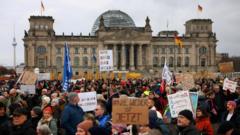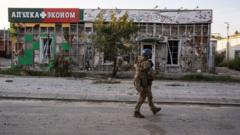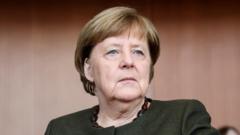The Freedom Party’s ascendancy in Austria signals a significant political shift towards the far right, bringing conservative and nationalistic ideologies to the forefront, reminiscent of broader trends seen across Europe.
Austria's Political Landscape Shifts: Freedom Party Poised for Power

Austria's Political Landscape Shifts: Freedom Party Poised for Power
The far-right Freedom Party under Herbert Kickl could radically transform Austrian governance, aligning with European far-right trends.
Article:
As Austria stands on the brink of a significant political transformation, the far-right Freedom Party, led by Herbert Kickl, is poised to take a crucial role in governance. Their rise is emblematic of a broader European movement towards ultra-conservative politics, showcasing a shift that many find alarming. The Freedom Party, or FPÖ, has been criticized for its strategies, which often include inflammatory rhetoric against immigrants, suggesting deportation and a ban on elements of political Islam.
This week marks a pivotal moment for the FPÖ as they negotiate potential coalitions to form a government, following unsuccessful attempts to prevent their rise to power. If successful, the party's takeover would not only mark a departure from Austria's traditional political norms but also intensify a pattern observed in various Western European countries, where far-right parties have grown in popularity.
The FPÖ has steadily expanded its base, capitalizing on national discontent, particularly around immigration and the effects of Covid-19 policies. Their anti-establishment stance resonates with a diverse demographic, attracting not just blue-collar workers but also women and younger voters. Recent European Parliament elections revealed the party as a frontrunner among Austrian voters under 35, highlighting a concerning generational shift towards their populist agenda.
Unlike neighboring Germany, where the far-right Alternative for Germany faces exclusion from ruling coalitions, Austria’s political framework has allowed the Freedom Party a sustained presence in government. This changing demographic and ideological landscape signals a reconfiguration of Austria's politics, one that reflects deeper anxieties present in contemporary Europe. As the Freedom Party prepares to take center stage, the repercussions for Austrian and European politics remain to be fully seen.
As Austria stands on the brink of a significant political transformation, the far-right Freedom Party, led by Herbert Kickl, is poised to take a crucial role in governance. Their rise is emblematic of a broader European movement towards ultra-conservative politics, showcasing a shift that many find alarming. The Freedom Party, or FPÖ, has been criticized for its strategies, which often include inflammatory rhetoric against immigrants, suggesting deportation and a ban on elements of political Islam.
This week marks a pivotal moment for the FPÖ as they negotiate potential coalitions to form a government, following unsuccessful attempts to prevent their rise to power. If successful, the party's takeover would not only mark a departure from Austria's traditional political norms but also intensify a pattern observed in various Western European countries, where far-right parties have grown in popularity.
The FPÖ has steadily expanded its base, capitalizing on national discontent, particularly around immigration and the effects of Covid-19 policies. Their anti-establishment stance resonates with a diverse demographic, attracting not just blue-collar workers but also women and younger voters. Recent European Parliament elections revealed the party as a frontrunner among Austrian voters under 35, highlighting a concerning generational shift towards their populist agenda.
Unlike neighboring Germany, where the far-right Alternative for Germany faces exclusion from ruling coalitions, Austria’s political framework has allowed the Freedom Party a sustained presence in government. This changing demographic and ideological landscape signals a reconfiguration of Austria's politics, one that reflects deeper anxieties present in contemporary Europe. As the Freedom Party prepares to take center stage, the repercussions for Austrian and European politics remain to be fully seen.






















